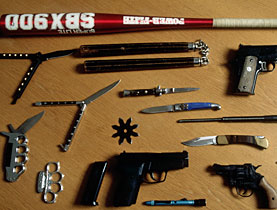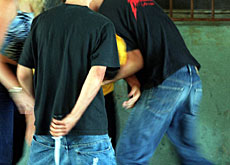Experts say integrate don’t expel offenders

The vast majority of Swiss want young foreigners convicted of serious crimes to be forced to leave the country, according to an opinion poll.
But experts question whether this “kneejerk” reaction, which has growing political support in Switzerland, can really prevent crime. Instead they call for better integration of young foreigners and their parents, especially in urban areas.
A survey published in three Swiss newspapers on Sunday revealed that 69 per cent of the 913 people polled were in favour of expelling violent young criminals.
The poll comes just over a week after three foreign-born men from the Balkans, aged between 19 and 21 – two with Swiss nationality, beat a young carnival reveller to death in Locarno. Two rightwing parties – the Swiss People’s Party and the Lega dei Ticinesi – called on the cantonal parliament to expel the men and revoke their Swiss nationality.
“I was surprised by such a harsh public reaction. There is a hard line against young foreigners in general throughout the poll,” Werner Reinmann, the report’s author, told swissinfo.
But psychologist Allan Guggenbühl, a professor at Zurich University who works with violent youngsters, said he was not so surprised, “as the terrible incident in Locarno arouses a lot of fear and anxiety”.
“We are abhorred by these incidents and want to get rid of the problem as soon as possible,” he said. “The easiest solution is expulsion. It’s natural to think this way but it’s not the solution.”
Unhelpful measure
The revised Swiss law on foreigners has strengthened the cantons’ hand to expel foreign criminals. Currently, those who have completed a sentence of at least two years behind bars can be expelled. While the measure has sizeable political support, it has only been applied very unevenly.
The People’s Party, meanwhile, wants to make the expulsion of foreign criminals for serious crimes automatic and this month is due to hand in its initiative to try and force a nationwide vote. But the question of expelling minors, and possibly their parents too, remains a sensitive political issue.
For Guggenbühl, even though Swiss citizens and foreigners are calling for tougher measures, the expulsion of minors is “unhelpful” when preventing crime, as “it doesn’t impress young people”.
In Switzerland, formalities and procedures mean that young criminals often wait one or two years between being charged for a violent crime and eventually being convicted, he said, which is too long, as they “somehow distance themselves from what they have done”.
Mirror of society?
“Young men are impressed when their liberties are taken away,” said Guggenbühl. “The convictions should be much quicker and simple. At the same time, we need to build a relationship with them.”
While the majority of foreign youths are very well integrated, especially in the countryside, there are groups in urban areas that need help, he said.
“It’s difficult to say if these kind of polls are a mirror of society,” said Simone Prodolliet, director of the Federal Commission for Foreigners. “But I think there’s a clear split between those in favour expelling people and those against.”
Prodolliet said if the Swiss wanted an effective long-term integration policy, they had to recognise that most of the young criminals in such incidents had grown up here.
What we are seeing, she said, are the effects of not properly integrating first-generation immigrants, who pass on all their problems to their children, she explained.
“It’s a long-term battle. We should do more prevention, give perspectives to young people and create more places, like youth clubs, where they can communicate with others and adults can share advice and set them limits,” she added.
“Those who don’t feel at home here need to feel as that they are being taken seriously,” she added.
swissinfo, Simon Bradley
14,045 youths (79.5% boys) were convicted of crimes in 2006, according to the Federal Statistics Office. The figure is up about 2,000 on 1999.
64.1% of the convicted youths are of Swiss nationality.
The number of convictions for driving offences, attacks against people and property-related crimes has been on the increase since 1999. But the authorities recorded a drop in the number of drug-related offences.
While police figures show a doubling of reported violent youth crimes in the past eight years and the public perception is of rocketing youth violence, researchers believe the figures should be treated carefully.
Studies in Switzerland, Germany, the Netherlands and Sweden came to the same conclusions – that police statistics are inflated by a growing tendency to report crimes to the authorities compared with a few years ago.
The federal law on acquiring and losing Swiss nationality foresees the possibility of having someone’s nationality withdrawn, “if the person’s behaviour seriously damages the interest or reputation of Switzerland”.
In reality, the withdrawal of nationality is only considered in extremely serious cases, such as if a person is condemned for war crimes.
For foreign citizens, the federal foreigners’ law foresees a series of measures: banned entry into Switzerland, cancellation of a residence permit and non-renewal of this permit.
The rightwing Swiss People’s Party is this month due to hand in an initiative to try and force a nationwide vote on the automatic expulsion of foreign criminals condemned of crimes such as murder, rape, robbery, drug trafficking, burglary, human trafficking or social security abuse.
At the end of February a parliamentary commission is due to discuss a People’s Party proposal to withdraw the passports of naturalised young criminals. It is currently possible to withdraw a person’s application if they have hidden serious crimes during the procedure, but killing someone in the street, as in the case of Locarno, is not a reason to withdraw a passport.

In compliance with the JTI standards
More: SWI swissinfo.ch certified by the Journalism Trust Initiative












You can find an overview of ongoing debates with our journalists here . Please join us!
If you want to start a conversation about a topic raised in this article or want to report factual errors, email us at english@swissinfo.ch.